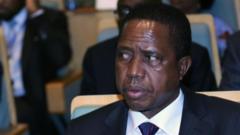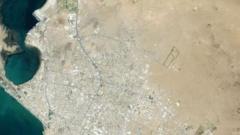Armed civilians in Jaramana, a predominantly Druse city, have taken to defending their neighborhood following recent sectarian clashes that left seven dead. With local tensions rising, many residents express disappointment in government protection efforts, prompting them to organize in a fight for their safety.
Residents of Jaramana Take Up Arms Amid Unrest

Residents of Jaramana Take Up Arms Amid Unrest
In the face of escalating violence, residents of Jaramana, Syria, form self-defense units amid a lack of government support.
In Jaramana, Syria, armed civilians have shifted from passivity to proactive defense as sectarian violence has surged, resulting in the deaths of seven local men. This predominantly Druse city, known for its tight-knit community, has witnessed a climate of fear and unrest as Islamist extremists targeted the area with gunfire and shelling, prompting residents to take security into their own hands.
On a somber Wednesday, heavily armed men could be seen patrolling the streets, their demeanor tense and focused. They formed improvised checkpoints, starkly visible amid the ongoing funeral processions for the victims, whose coffins lay draped in velvet inside a communal religious hall. Hundreds of mourning women, clad in white shawls, raised photos of their loved ones lost to the violence, symbolizing the grave toll the conflict has taken.
The resident-led defense units, composed primarily of local men, emerged from a palpable sense of neglect. “We’re not seeing anything from the government,” remarked Ghassan Azzam, a local community member. “We’re just protecting ourselves.” The stark reality of the situation bore witness to a disconnection between official forces and community needs, as residents felt abandoned during a time of crisis.
While Syrian security forces maintained a presence in the city, worries about rising clashes and a growing death toll significantly fueled the urgency for self-defense. The local population’s mobilization underscores a broader narrative of reliance on community solidarity in times of governmental inadequacy, hinting at a deepening polarization in the already fractured landscape of the Syrian conflict.





















